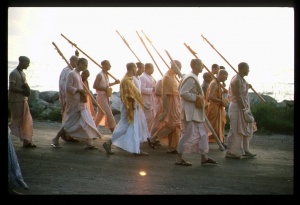CC Madhya 18.150: Difference between revisions
m (1 revision(s)) |
(Vanibot #0054 edit - transform synonyms into clickable links, which search similar occurrences) |
||
| (One intermediate revision by one other user not shown) | |||
| Line 1: | Line 1: | ||
{{ | [[Category:Sri Caitanya-caritamrta - Madhya-lila Chapter 18|C150]] | ||
<div style="float:left">'''[[Sri Caitanya-caritamrta|Śrī Caitanya-caritāmṛta]] - [[CC Madhya|Madhya-līlā]] - [[CC Madhya 18|Chapter 18: Lord Śrī Caitanya Mahāprabhu's Visit to Śrī Vṛndāvana]]'''</div> | |||
<div style="float:right">[[File:Go-previous.png|link=CC Madhya 18.149|Madhya-līlā 18.149]] '''[[CC Madhya 18.149|Madhya-līlā 18.149]] - [[CC Madhya 18.151|Madhya-līlā 18.151]]''' [[File:Go-next.png|link=CC Madhya 18.151|Madhya-līlā 18.151]]</div> | |||
{{CompareVersions|CC|Madhya 18.150|CC 1975|CC 1996}} | |||
{{RandomImage}} | |||
==== TEXT 150 ==== | ==== TEXT 150 ==== | ||
<div | <div class="verse"> | ||
tabe sukha haya yabe gaṅgā-pathe yāiye | :tabe sukha haya yabe gaṅgā-pathe yāiye | ||
ebe yadi yāi, ‘makare’ gaṅgā-snāna pāiye | :ebe yadi yāi, ‘makare’ gaṅgā-snāna pāiye | ||
</div> | </div> | ||
| Line 12: | Line 16: | ||
==== SYNONYMS ==== | ==== SYNONYMS ==== | ||
<div | <div class="synonyms"> | ||
''[//vanipedia.org/wiki/Special:VaniSearch?s=tabe&tab=syno_o&ds=1 tabe]'' — then; ''[//vanipedia.org/wiki/Special:VaniSearch?s=sukha&tab=syno_o&ds=1 sukha] [//vanipedia.org/wiki/Special:VaniSearch?s=haya&tab=syno_o&ds=1 haya]'' — it will be great happiness for me; ''[//vanipedia.org/wiki/Special:VaniSearch?s=yabe&tab=syno_o&ds=1 yabe]'' — when; ''[//vanipedia.org/wiki/Special:VaniSearch?s=gaṅgā&tab=syno_o&ds=1 gaṅgā]-[//vanipedia.org/wiki/Special:VaniSearch?s=pathe&tab=syno_o&ds=1 pathe]'' — on the path of the Ganges; ''[//vanipedia.org/wiki/Special:VaniSearch?s=yāiye&tab=syno_o&ds=1 yāiye]'' — we go; ''[//vanipedia.org/wiki/Special:VaniSearch?s=ebe&tab=syno_o&ds=1 ebe] [//vanipedia.org/wiki/Special:VaniSearch?s=yadi&tab=syno_o&ds=1 yadi] [//vanipedia.org/wiki/Special:VaniSearch?s=yāi&tab=syno_o&ds=1 yāi]'' — if we go just now; ''[//vanipedia.org/wiki/Special:VaniSearch?s=makare&tab=syno_o&ds=1 makare]'' — during Makara-saṅkrānti; ''[//vanipedia.org/wiki/Special:VaniSearch?s=gaṅgā&tab=syno_o&ds=1 gaṅgā]-[//vanipedia.org/wiki/Special:VaniSearch?s=snāna&tab=syno_o&ds=1 snāna] [//vanipedia.org/wiki/Special:VaniSearch?s=pāiye&tab=syno_o&ds=1 pāiye]'' — we can take a bath in the Ganges. | |||
</div> | </div> | ||
| Line 19: | Line 23: | ||
==== TRANSLATION ==== | ==== TRANSLATION ==== | ||
<div | <div class="translation"> | ||
“I will be very happy if we all leave and take the path by the banks of the Ganges. Then we can have the opportunity of bathing in the Ganges at Prayāga during Makara-saṅkrānti. | “I will be very happy if we all leave and take the path by the banks of the Ganges. Then we can have the opportunity of bathing in the Ganges at Prayāga during Makara-saṅkrānti. | ||
</div> | </div> | ||
| Line 26: | Line 30: | ||
==== PURPORT ==== | ==== PURPORT ==== | ||
<div | <div class="purport"> | ||
There are two great occasions for bathing in the Ganges during Māgha-melā. One is on the day of the dark moon, and the other is on the day of the full moon during the month of Māgha. | There are two great occasions for bathing in the Ganges during Māgha-melā. One is on the day of the dark moon, and the other is on the day of the full moon during the month of Māgha. | ||
</div> | </div> | ||
__NOTOC__ | |||
<div style="float:right; clear:both;">[[File:Go-previous.png|link=CC Madhya 18.149|Madhya-līlā 18.149]] '''[[CC Madhya 18.149|Madhya-līlā 18.149]] - [[CC Madhya 18.151|Madhya-līlā 18.151]]''' [[File:Go-next.png|link=CC Madhya 18.151|Madhya-līlā 18.151]]</div> | |||
__NOTOC__ | |||
__NOEDITSECTION__ | |||
Latest revision as of 22:19, 19 February 2024
Śrī Caitanya-caritāmṛta - Madhya-līlā - Chapter 18: Lord Śrī Caitanya Mahāprabhu's Visit to Śrī Vṛndāvana

His Divine Grace
A.C. Bhaktivedanta Swami Prabhupada
A.C. Bhaktivedanta Swami Prabhupada
TEXT 150
- tabe sukha haya yabe gaṅgā-pathe yāiye
- ebe yadi yāi, ‘makare’ gaṅgā-snāna pāiye
SYNONYMS
tabe — then; sukha haya — it will be great happiness for me; yabe — when; gaṅgā-pathe — on the path of the Ganges; yāiye — we go; ebe yadi yāi — if we go just now; makare — during Makara-saṅkrānti; gaṅgā-snāna pāiye — we can take a bath in the Ganges.
TRANSLATION
“I will be very happy if we all leave and take the path by the banks of the Ganges. Then we can have the opportunity of bathing in the Ganges at Prayāga during Makara-saṅkrānti.
PURPORT
There are two great occasions for bathing in the Ganges during Māgha-melā. One is on the day of the dark moon, and the other is on the day of the full moon during the month of Māgha.